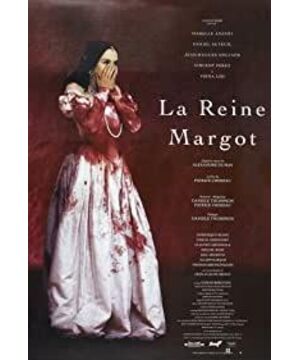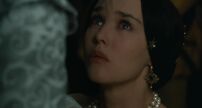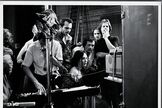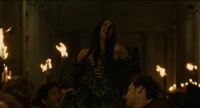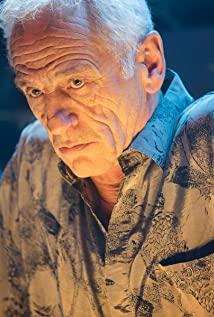When they got married, Henry of Navarre was 19 and Margo was 20. The Henry in the movie was old and gaunt, and seemed to be a year older than Margo's brothers, with short tousled hair, simple black clothes, and a small stature. And Adjani is still beautiful and charming, her clear pale blue eyes gleaming, attracting countless scorching gazes, and amorous people will sigh that our Aphrodite married the lame Vulcan, and this marriage is only a tragedy Start.
As a buffer between Catholics and Huguenots, Margo isn't the only unfortunate one. In the early morning after the night of San Bartololio, the streets and alleys of Paris were full of pale corpses. Henry converted to save his life. At this time, Anjou and Giz beside him were still covered in Protestant blood. Margo complained to her mother, the Queen Mother Catherine: "Your son is to be cursed, and so am I... because you used me as a bait for slaughter." But her family had no time to care about Margo. Henry, under his control, still held the kingdom of Navarre and enjoyed the succession to the French throne, and both the Huguenots and Navarre eagerly awaited his return. The ruthless and vicious Catherine, the sinister and cunning Anjou, the young and ambitious Alençon, after the ominous prophecy of the warlock, the Delois family's plan to get rid of Henry stepped up, and after the unexpected hunting incident, the cowardly, neurotic Charles IX was grateful to Henry and became his protector, because the most useless man in the Louvre had a crown that no one could ignore. Just as Vulcan was not lacking in wisdom, the future Henry IV finally returned to his supporters intact.
For Margo, who has a bad reputation, Henry is not a picky and jealous husband. The alliance between the two is the essence of their marriage. However, the couple in adversity respected each other. Margo helped Henry escape the Louvre's guns and arrows again and again. Henry also said in public after getting out of trouble, "I will not abandon Margo, she has never abandoned me, never betrayed me. , though she never loved me." It seems fate, the family's imposition on Margot's husband, is the reason why she met and fell in love with de la Mole. The young man who cursed the princess at the beginning did not come to Paris for the wedding, but met Margo, who was hunting for beauty on the streets of the lonely wedding night. Once the spring breeze, it was Margo who saved the badly wounded on the night of the massacre of the Protestants. A young man, de Larmor has since admired Margot. Because of Henry again, he said to Margot, who escaped from the Louvre, "You must go back because your husband saved the king...". When Henry promised: "Tell Margot that Navarre will give her a place of refuge until the end of her life...with her loved ones." De Larmor ventured back to Paris and lost his life.
As for Henry, a happy family life seems to be out of his reach. In his early years in Navarre, he grew up happily under the careful guidance of his mother Jeanne, while his father fooled around with his mistress at the court of Paris, leaving his wife and children behind. On the eve of his wedding, his mother was poisoned by Catherine de' Medici, and he wanted his enemy to marry his daughter Margaret, who was rumored to be having an affair with his own brother. For political needs, another Medici, Widow Mary became his second queen, bore him an heir, and participated in his assassination.
Henry eventually became king of France, and neither Meroving nor Capet or Valois had the dynastic era named after his surname Bourbon so colorful and impressive to the world that he not only left behind The Edict of Nantes, which stabilized France and left Louis XIII, Louis XIV, Louis XV, and Louis XVI.
View more about Queen Margot reviews


